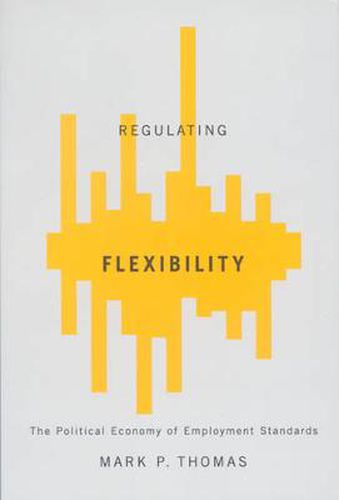Readings Newsletter
Become a Readings Member to make your shopping experience even easier.
Sign in or sign up for free!
You’re not far away from qualifying for FREE standard shipping within Australia
You’ve qualified for FREE standard shipping within Australia
The cart is loading…






In a contemporary labour market that includes growing levels of precarious employment, the regulation of minimum employment standards is intricately connected to conditions of economic security. With a focus on the role of neoliberal labour market policies in promoting ‘flexible’ employment standards legislation - particularly in the areas of minimum wages and working time - Mark Thomas argues that shifts toward ‘flexible’ legislation have played a central role in producing patterns of labour market inequality. Using an analytic framework that situates employment standards within the context of the broader social relations that shape processes of labour market regulation, Thomas constructs a case study of employment standards legislation in Ontario from 1884 to 2004. Drawing from political economy scholarship and using a qualitative research methodology, Thomas analyses class, race and gender dimensions of legislative developments, highlighting the ways in which shifts towards ‘flexible’ employment standards have exacerbated longstanding radicalised and gendered inequities.
Regulating Flexibility argues that in order to counter current trends towards increased insecurity, employment standards should not be treated as a secondary form of labour protection but as a cornerstone in a progressive project of labour market re-regulation.
$9.00 standard shipping within Australia
FREE standard shipping within Australia for orders over $100.00
Express & International shipping calculated at checkout
In a contemporary labour market that includes growing levels of precarious employment, the regulation of minimum employment standards is intricately connected to conditions of economic security. With a focus on the role of neoliberal labour market policies in promoting ‘flexible’ employment standards legislation - particularly in the areas of minimum wages and working time - Mark Thomas argues that shifts toward ‘flexible’ legislation have played a central role in producing patterns of labour market inequality. Using an analytic framework that situates employment standards within the context of the broader social relations that shape processes of labour market regulation, Thomas constructs a case study of employment standards legislation in Ontario from 1884 to 2004. Drawing from political economy scholarship and using a qualitative research methodology, Thomas analyses class, race and gender dimensions of legislative developments, highlighting the ways in which shifts towards ‘flexible’ employment standards have exacerbated longstanding radicalised and gendered inequities.
Regulating Flexibility argues that in order to counter current trends towards increased insecurity, employment standards should not be treated as a secondary form of labour protection but as a cornerstone in a progressive project of labour market re-regulation.